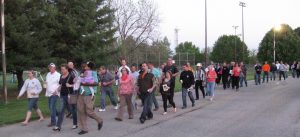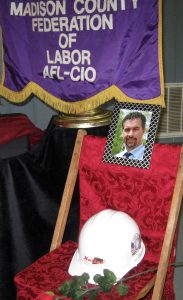Judge: Workers compensation is not out of control in Illinois

Workers Memorial Day Observance
Alton, IL – Political claims that workers’ compensation cases in Illinois are “out of control” are not supported by the facts, which show a dramatic decrease in the cases since 2000, Circuit Judge Dennis Ruth said at Madison County’s annual observance of Workers Memorial Day.
The year 2000 was the high point for workers’ comp cases in Illinois, at about 71,000, Ruth said, but cases have since dropped steadily to about 43,000 a year.
It’s not that employment has decreased by that much, but that the rate of injury has dropped by two thirds over the past 25 years, he added.
“The good news is we have a lot of good employers who try to be safe and try to care for their employees,” said Ruth. “Illinois workers’ compensation claims are not out of control.”
The Greater Madison County Federation of Labor holds the Workers Memorial event every April 28 at Gordon Moore Park in Alton. The large crowd meets in the park’s Muensterman Building and then walks together by candlelight to the Workers Memorial near the park entrance. Names of workers killed on the job are read, accompanied by the tolling of a bell. The program ends with the playing of “Amazing Grace” on pipes.
Ruth, a circuit judge in Madison County and formerly the state’s chief workers’ compensation judge, said suggestions that workers become injured on purpose are ridiculous.
“Being injured at work sucks, and sometimes it sucks really bad,” he said. “I don’t know any other way to say it.”
Being injured on the job, he said, increases chances of stress, depression and other emotional problems; means a higher rate of divorce, less interaction with children and other problems with the family; a greater chance of becoming addicted to pain medicine; more likelihood of bankruptcy, foreclosure, eviction and even earlier death. Costs to society include lost productivity and tax revenues.
“They’re all very real, and they’re all very significant,” Ruth said. “Nobody in their right mind wants to get hurt at work. And anybody who says otherwise – and we hear such things coming out of Springfield nowadays – doesn’t know what they’re talking about.
“The physical, financial and social consequences are simply not worth it.”
In one case, a man’s foot was run over by a forklift, and in court, the insurance company argued for less payment for his medical care because of the likelihood he would die earlier, Ruth said.
KOLWEIER HONORED

The service honored Roger R. Kolweier, of O’Fallon, IL, who is being added to the Memorial after his death last May 28. Kolweier, a heavy equipment engineer, was killed while operating a roller on a frontage road at Southern Illinois University Edwardsville. The road collapsed below him, causing the machine to turn over on him.
Surviving were his wife, Shelley, three sons and two daughters. He was a member of Operating Engineers Local 520. Paul Fernandes, his pastor at Faith Family Church in Shiloh, described Kolweier at the memorial.
“He was funny, he was fun, he was selfless, he was fearless, he was a man of integrity, he was happy, he was reliable, he was Mr. Fixit, he was a hard worker, he was a leader, he was a man of God,” Fernandes said. “He was adventurous, he was caring, he was loving to his friends, his family and his co-workers, he was a father and he was a husband. Roger lived a life in the moment.
“He was one hard-working man,” the pastor added. “Lazy was not in his vocabulary whatsoever. He put 110 percent into work, he put 110 percent into his family, and then he did some side gigs and cut his neighbor’s yard. He was that kind of guy.”
A color photo of Kolweier was displayed at the memorial service. “When I look at this picture, I feel like he’s a man who makes you feel valued, who makes you feel like you can do anything you put your mind to,” Fernandes added.
CORONER’S VIEW
Madison County Coroner Steve Nonn noted three other men killed at work in the county last year, out of 35 statewide:
- Justin Jokerst, 31, of Ste. Genevieve, killed Jan. 12 at a warehouse when a boom fell onto him from a crane. He left a pregnant wife and a young child.
- Zachery Boland, 19, of Mitchell, killed July 15 in a forklift accident at a job in Pontoon Beach.
- Geoffrey Walthes, 34, a masonry contractor from Germantown, killed Aug. 13 when he came into contact with a power line while on a scaffold. He had a wife and two daughters.
Nonn noted that his office is charged with determining how these deaths happened in an effort to reduce future accidents.
“It’s on me, and I take that job very seriously, when we are responding to a workplace tragedy,” he said.
“Cooperation is what’s going to lead to reducing these on-the-job fatalities and injuries,” he added. “Cooperation between labor and management is key to workplace safety, and strong cooperation among utilities, contractors and unions is essential.
“The people who are carrying the tools and who are exposed to the hazards have to be the focus of our concern. We don’t want anybody dying on the job.”



Leave a Reply